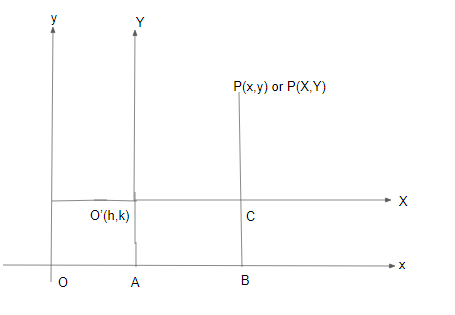Question
Question: Find the coordinates of the point \(P\left( {2,4} \right)\) with respect to the translated axis with...
Find the coordinates of the point P(2,4) with respect to the translated axis with origin at (1,3)
A. (1,−1)
B. (1,1)
C. (−1,−1)
D. (−1,1)
Solution
We will first consider the random point P(x,y) and a fixed point O′(h,k) in the X−Y plane. As we know that the equations X=x−h,Y=y−k are called transformation equations and then convert the point P(x,y) with respect to the new coordinate systemP(x−h,y−k). As we are given the translated axis origin point so put it equal toO′(0+h,0+k) to determine the values of h and. Thus, we get the point P(x,y) and P(x−h,y−k) by substituting the values.
Complete step by step Answer:
Let P(x,y) be any point in the XYplane. Let O′(h,k) be the fixed point in XYplane. We draw two perpendicular axes throughO′. The X-axis is parallel to x-axis and Y-axis is parallel to y-axis. O′Is the new origin for XYplane. The point P has the coordinates(X,Y) with respect to the XYplane.
Consider the diagram:

Thus the point P(x,y) with respect to the XYplane is P(x−h,y−k)
From the diagram and given in the question:
Translated axis origin is at O′(1,3)
Now
The translated point is O′(0+h,0+k)
Now we will put the translated axis origin and the translated point equal to determine the value of (h,k)
Thus we get:
⇒O′(0+h,0+k)=O′(1,3) ⇒0+h=1 and 0+k=3 ⇒h=1 and k=3
Now from the given question, given (x,y) points i.e. P(x,y), put these points in translated point equation i.e. O′(0+h,0+k)
Where
h=1 and k=3
This we get:
Translated points:
P′(2−1,3−4) ⇒P′(1,1)
Thus we get the translated point as P′(1,1).
The correct option is B.
Note: It’s necessary to construct the diagram for the given question. We have used the concept of transformation of the axis. As we have also found the new coordinate using the old coordinates. We have obtained the value of h and k to obtain the value of new coordinates.
